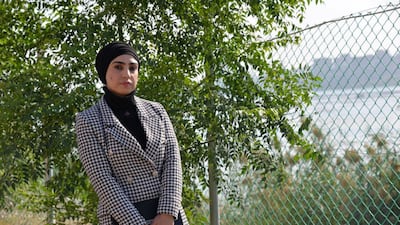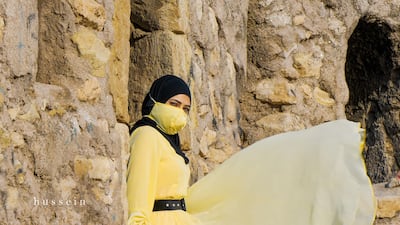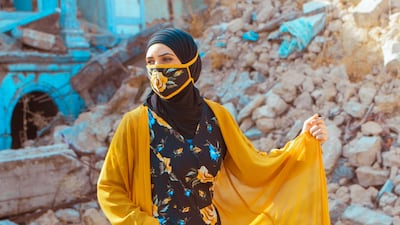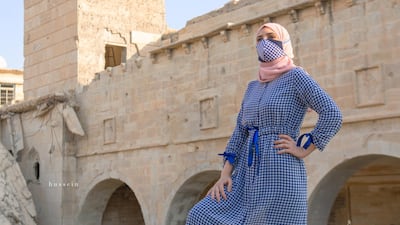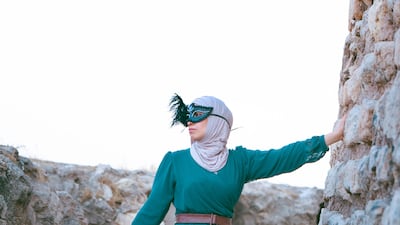When Hiba Al Sabhan plucked up the courage to announce the first fashion line in Mosul, she received support from an unexpected faction.
“Surprisingly,” she recalls, “that group was men,” pointing to a new trend in a city long known – at least since the 1990s - for conservatism.
Ms Al Sabhan’s concern was about showing female models, all dressed in accordance with the Muslim faith’s dress code, in an outdoor photoshoot at the edges of rubble-strewn buildings and broken remnants of the past.
Until recently, Mosul suffered under a reign of extremist terror.
The designer, whose talent speaks for itself, has to pay careful attention to the main purpose of simple poses; she wants to slowly change social attitudes in her birthplace.
After years of suppression and humiliation under ruthless terrorists, this woman's ambitions are finally unbound.
But she can still expect two reactions: the first is suspicion in an Iraqi city with a culture of machismo that belittles women’s aspirations and achievements. The second is appreciation and encouragement.
Almost as soon as Ms Al Sabhan made her announcement on Facebook, the comments started flying.
"Keep it up! Well done," read one.
"Seriously! You are doing this in a city where men still refuse to shake hands with women," went another.
In this moment of widespread patriarchy, Ms Al Sabhan is having to navigate social and traditional minefields.
"I am a free spirit but lucky to have a very supportive family including my father and three brothers," she told The National, a few days after the launch of her beautiful embroideries.
She joins a growing generation of Muslim women who are taking to social media to show off their hijab, as well as a passion for the latest trends.
For those looking for inspiration, there's certainly no shortage in the first collection of the designer; a fusion of stunning pieces of cloaks, dresses and suits filled with floral and bright fabrics such as silk and satin.
Ms Al Sabhan, 37, chose to display her collection of silk and satin womenswear against a backdrop of heritage sites that the militants either reduced to rubble or badly damaged, such as the 12th century Bash Tapia castle on the western bank of the Tigris River.
She says the unconventional choice of backdrop and carefully chosen poses are intended to send a message.
"There are talents that are born from the rubble of war, but I also want to draw our government's attention to the painfully slow pace of the rehabilitation process, which is only so far on paper," she says, reminding me of some of Mosul's breath-taking cultural antiquities such as Al Sa'a Church (church of the clock), and the iconic Al Hadba minaret (meaning the hunchback, as it was leaning before its destruction by ISIS).
Once upon a time, both Christian and Muslim symbols were sharing the skyline of Mosul.
Not so long ago, any woman in Mosul (the name of which roughly translates in Arabic as the linking point) would have been beaten, flogged or at least fined if she had gone out without the multi-layered all-covering black, loose niqab and burqa.
The strict attire was imposed by ISIS in area it used to control in Iraq. And Mosul was the terrorist group's main stronghold in the country.
Women were also forced to be accompanied by a male guardian, known in Arabic as a mahram, nearly at all times. It was considered obscene for a woman to even put a picture of her face online.
Today Ms Al Sabhan, like many other women in Iraq’s second city, is neither hidden nor wearing the burqa because “it reminds us of Daesh. We were forced to wear it. It is not welcome anymore,” says the hijab-clad single woman, who is proud of calling herself a feminist although, “some women in my city wrongly believe that a feminist is a man-hater,” she laughs.
War widows
For decades, men have been considered families’ sole breadwinners in Mosul, despite the fact that many women have held government jobs as teachers, doctors and nurses, until 2014 when the Islamist extremists seized the city.
After the murderers of ISIS were defeated and the city was liberated in 2017, many women have had to grasp the unpleasant reality of losing their husbands.
Some were murdered by the extremists. Others were killed in airstrikes, based on faulty intelligence, were shot dead or blown up by landmines as they fled the front lines in a desperate bid to escape from intense fighting, which raged for months.
Those who remained in the city, like Ms Al Sabhan and most of her family members, survived the war by a miracle. In addition to the physical destruction caused by the war, the psychological toll on the Moslawis (Arabic for inhabitants of Mosul) and many Iraqis has been immense.
The widows have found themselves without an income and often with children to support.
“Eking out a living in Mosul has become crucial for many women, out of necessity,” says the art and fashion enthusiast, who started drawing when she was just six-years-old.
“We want to make great progress towards equality with men, especially in workplaces and education; women need to be self-reliant and financially independent, but the harsh reality in different parts of Iraq tells a story of women who must work to provide for their children,” adds Ms Al Sabhan, who has remained unemployed, despite graduating with an English literature degree from the University of Mosul in 2012, as well as attaining a degree in agriculture in 2007.
To support her business, she has already applied for a $30,000 interest-free loan from the US Agency for International Development (USAID) because she has no income and still relies on her father.
Unemployment remains in double digits in Iraq, with the latest World Bank figures showing nearly 13 per cent of the population out of work. The real figure is likely far higher.
The economic slowdown produced by the Covid-19 pandemic has further tested the resilience of the Iraqis.
'A lesson for men'
Despite a culture of deeply ingrained patriarchal traditions, Ms Al Sabhan believes that some men have changed their attitudes towards women following their own experience of living under the harsh rule of ISIS.
“They were smothered by the ignorant, illiterate ISIS members who had very abrasive personalities. It was a lesson for men who are used to degrading women,” says Ms Al Sabhan, who is especially happy with the messages of support on Facebook from Iraqi men.
Her brother Abdel-Rahman, a 31-year-old triathlete, has also been a stalwart supporter.
“Men should start showing respect to women by supporting the women in their lives and help them flourish. We should collaborate not compete with them,” he told The National. “We should help them take every opportunity and challenge that come their way without questioning their worth.”
In releasing her first collection, Ms Al Sabhan was influenced by global fashion brands for women and catered to Islamic requirements and Arabic shades in her designs. But there’s one noticeable additional item: a face mask.
The masks are encouraged, as they have become a medical necessity until effective vaccines for Covid-19 are distributed worldwide. But for Ms Al Sabhan, the face masks are also a fashion statement. So, what do they say?
“I wanted to underline decency and modesty. True, everyone is donning a face mask nowadays but it’s still a delicate situation in deeply conservative Mosul. I fretted about antagonising many people. But after the welcome reaction, I promise that the models in my second ensemble will not conceal their faces,” she says.
